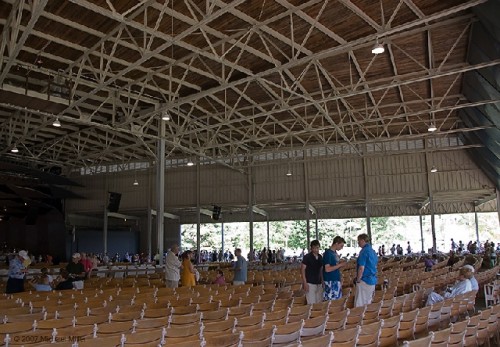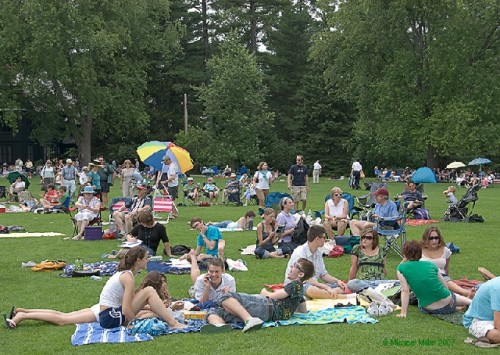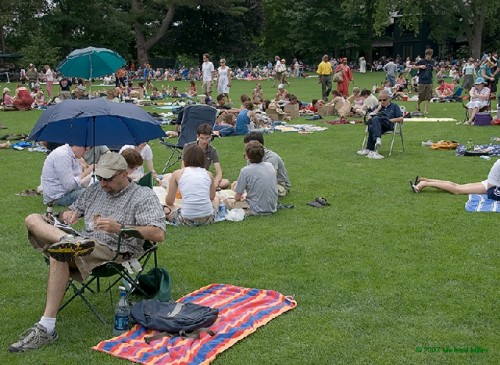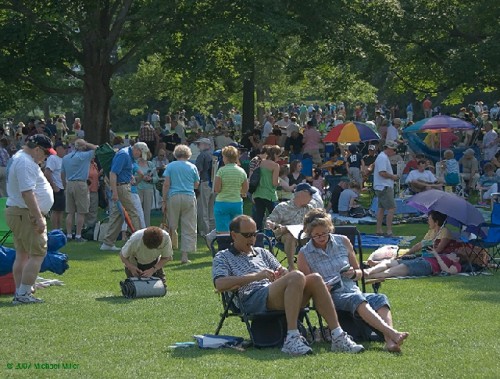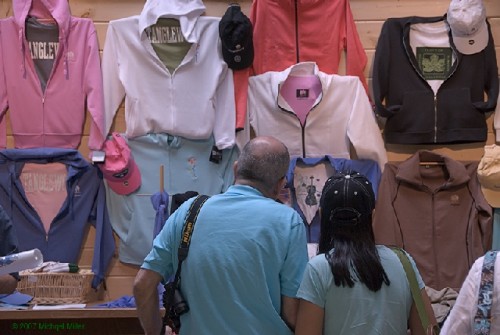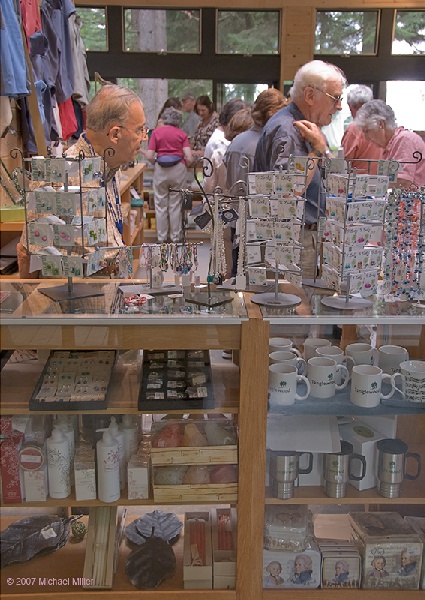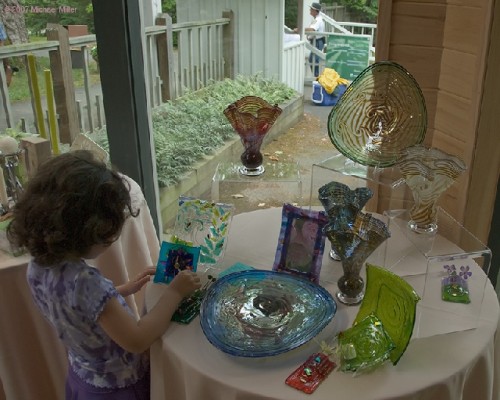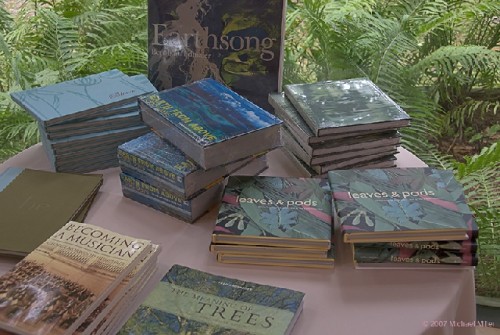Tanglewood Tantrums
Is Tanglewood relevant today?
By: Michael Miller - Jul 10, 2007
When I first read the recent editorial (Tuesday, June 26) about Tanglewood in the Berkshire Eagle, I must admit I was peeved. I could have dashed something off then and there, but my daimon told me to wait and to ground myself in the opening weekend of the Festival first. With maturer reflection I thought of what I used to read in The Onion, when I lived in New York, and I realized that it was all a joke. It is well known that people under thirty get most of their news from comedy programs on tv, and now the Berkshire Eagle has hit on a brilliant way to ensure its future. Go Onion. Ridentem dicere verum. The humor in those Tanglewood pieces was targeted at younger readers. That's why I didn't get it at first.
Once I realized that the Eagle was putting a jolly face on harsh realities in order to persuade the benighted fossils in Boston that run Tanglewood to do the right thing, I understood that they were perfectly right, not least because if, as an organ of the press, another threatened institution, they have done such an excellent job of saving their own skin, they are fully justified in giving advice to a brother in peril. It's not at all like one drowning man taunting another in the moment before they both go down. This elitist institution that sits on all that valuable real estate and essentially lets the ghosts of all those dead European composers squat there for free had better get its ass moving and change, but quick.
I remembered my early days as an art historian. At the time one heard a lot about the environmental tribulations of Venice, which was being engulfed by the Adriatic. Nothing has changed, but it was in the news back then. Large sums of money were being raised, above all in America, and the Italian government took the matter in hand as well. Funds disappeared into mysterious hands and nothing was done. It occurred to me at the time that perhaps the best hope of La Serenissima was to be acquired outright by Walt Disney, and transported stone by stone, at least the most interesting parts, to Orlando, where she could be reassembled, safe from the elements, insect and rat free, easily and safely accessible to tourists, and none of that wierd black stuff they eat over there. Why not? The money surely was there, and with a bit of bullying from the American government and a few well-placed bribes, it could have been done, I'm sure.
Then I began to have visions of what Tanglewood really could be, if those fuddy-duddies in Boston ever got a bit real, and I began to think seriously about what the Eagle said and what all those smart, proactive people chipped in of their own free will. I imagine the Eagle editorialist was speaking for local business people, who are toiling away at their dreams of an urban renaissance and willing to resort to a spot of public blackmail to gain some support from a well-heeled non-profit in Lenox, the most prominent summer attraction in the area, in fact.
At issue is June, "a beautiful month, but largely a lost one at Tanglewood." They mention a number of "cutting edge but low-fi artists" who "would attract a younger demographic to Tanglewood," and they've even thought of deep issues like "problems from overindulgence." Of course the point is to save Tanglewood and the BSO with their desperate 5.5% deficit, but there is of course a great desire to attract paying customers into the region in a quietish month. The editorialists don't seem to have thought of the expense of opening up Tanglewood a month earlier, getting the place in order, hiring extra guards, and then cleaning it up for the Festival proper. Will it be worth all the trouble and expense? Should Tanglewood really attach its name to the innocuous rock and country groups the Eagle recommends? Janis Joplin and The Who are cited as precedents, but their presence at Tanglewood was an aberration of their time, and both Janis Joplin and The Who were representative figures of that time. It is to Tanglewood's credit that they dipped a toe into the the currents of that time, when pop music was a vital expression of a generation. Perhaps you could even trace an occasional whiff of weed on the lawn. What's more, it is ridiculous to compare "Bright Eyes" or "Guster" to them in artistic terms. (If you are in any doubt about just how idiotic these performers actually are, I invite you to watch the video on Guster's Web site, in which the group perform a sort of ballet on Segways...oh, it's social criticism! There's another one I missed!) As a classical person I might be a little dull in this respect but a real Joplin or Who fan might find it obscene.
And what do you think you are going to get out of it? Are the audiences going to stay at the Red Lion and dine at Le Zinc? Are the regulars going to be happy to see them there, if they do? How are the regulars going to feel, if they can't walk in a get their favorite table, because the restaurant is full of yuppies? They may well side-skirt Lenox and Pittsfield altogether and congregate at the Lanesborough Mall for the necessaries of civilization and a comforting sight of reality after all those empty green spaces. Most likely camping areas will be full. Concert-goers may even complain that they can't camp on the Tanglewood grounds. There will be have to be added police, clean-up, etc., and everyone will be whining about how they were exploited by Tanglewood, while it was trying to make an extra buck. It all smacks of the old down home trick of getting Tom Sawyer to paint the fence for you. Perhaps country people aren't as smart as they used to be, and someone at the BSO between the Mark Volpe and the corporate lawyers should be able to figure it out and say no, thank you very much.
The crux of the issue is that Tanglewood was founded with a specific mission in mind, a lofty one (to use a long-outmoded word for it. Today we might say "ambitious," but that misses the point.) The founders made it very clear, even before Serge Koussevitzky and the BSO became involved in 1936, that the mission of the Berkshire Symphony Festival, as it was then called, was to offer the greatest music in the best performances. Its explicit model was the Salzburg Festival. When Dr. Koussevitzky did take over—and indeed he did take over—the original high standards became fused with his vision of a music and art center, which would include all aspects of the best music, including contemporary music, as well as a music school, fulfilling a dream of a similar center he had envisioned for Moscow twenty-five years earlier. As he said in 1938, "This great Music and Art Center has to be the Creative Musical Center, where the greatest living composers will teach the art of composition; the greatest virtuosi, the art of perfect performance; the greatest conductors, the mystery of conducting orchestras and choruses. The most eminent thinkers and scholars will lecture there. A free cooperation of such an élite will certainly result in a creation of new and great values of art; in the radiation of the beams of culture over a nation and over the whole world, and finally, in the education and training of a generation of American artists."
Of course we don't talk like that any more, but it isn't Chaucer either. Apart from the semicolons and the unapologetic mention of an élite, there is a faith in the value of art which we find a little embarrassing today. In spite of our over-riding tendency to see the arts in commercial terms, Dr. Koussevitzky's vision was fulfilled beyond his wildest dreams, if we consider the Berkshires as a whole. His Chautauqua-like idea of an intellectual component to the Festival, although not realized at Tanglewood itself, is brilliantly represented within a sixty-mile radius, between Great Barrington, Bard, Amherst, and Bennington. Neither the Clark nor WCMA (in its present form) existed back then. And his musical ambitions were magnificently realized in James Levine's splendid opening concert of the season and in the Juilliard Quartet's celebration of the Bartók Quartet cycle organized by Dr. Koussevitzky himself in 1948. All this is quite real, even if the general public find it easier to read about the political and business sides of the arts—finances and marketing—than about the guiding issues of art, even if Janis Joplin, The Who, and James Taylor have performed at Tanglewood, even if Tanglewood has to some extent been commercialized, as many complain.
Some people on either side of the present issue might say that the damage has already been done. If middle-brow icons like James Taylor, the excruciating Garrison Keillor, and the Boston Pops are already established there, why not push it further, for the benefit of all, from local business people to those snotty elitists who actually get something out of Bartók, or say they do, just to piss off the rest of us. The problem is Dr. Koussevitzky's mission, which, as I have just shown, is still very much alive. The Eagle editorialist may even be disappointed to learn that the Bartók program in Seiji Ozawa Hall, opening night, and the Sunday afternoon BSO concert under Sir André Previn, were very well attended, in spite of intermittent bad weather—terrible weather, in fact. What's more the audiences, especially on opening night were not particularly decrepit. There were a lot of young people there on Friday evening and Sunday afternoon, and they were visibly having a great time.
If the Eagle editorial shamed people into coming, that's a good thing, but I doubt that is why they came. Without being in a position to organize focus groups or pass around questionnaires, I'll venture to say that they came for the usual reasons, that is, to do what I saw them doing there, which consists basically of the two things Tanglewood offers the public: 1. Excellent, often great music-making, 2. a very pleasant place to have a picnic, drink wine, and hear excellent, often great music-making, somewhat in the background and electronically mediated. The demise of classical music and the greying head syndrome are fashionable topics today, but it's not entirely true. In spite of the obvious maturity of a good part of the audience (and among the grey heads I have to include my own), classical music and Tanglewood seem remarkably spry.
Both the Eagle's article and the editorial were rife with fallacies and misinformation, among them the statement about opera: "Does Tanglewood's future audience want to be immersed in opera — BSO music director James Levine's deepest love — or does it want Dave Matthews, Nickelback and Nelly Furtado in addition to Tchaikovsky's crowd-pleasing 1812 Overture, the classic pyrotechnic finale to Tanglewood on Parade?" First of all, Tanglewood audiences aren't quite that philistine, and opera is a Tanglewood tradition going back to Dr. Koussevitzky himself. One of the reasons James Levine was hired as music director was to resurrect the opera program. Jessica Willis ("Off-key in Lenox," Berkshire Eagle, June 25), if she did not attend last year's Don Giovanni, might have asked about it. The Shed was not only close to sold out, but a good number of the seats were occupied by twenty- and thirty-somethings. From my experience as an attender and observer, I'd say that opera is an excellent and appropriate way to attract a bigger and younger audience to Tanglewood. Dave Matthews, Nickelback and Nelly Furtado are not. On a date, opera has the same allure as an $1800 cocktail, it's a damn sight cheaper and its effect lingers longer.
Another fallacy is the comparison with the Saratoga Performing Arts Center. It should be clear from what I said about the early days of Tanglewood that it was founded on a mission. It exists to fulfill this mission, which is still relevant today, and this is proven by its success in realizing the mission only in the past few days. Anyone who compares Tanglewood to SPAC simply doesn't understand what Tanglewood is about. The most pernicious trend in the arts today is the illusion that any initiative, whether it is an individual artist or large-scale endeavor like Tanglewood, must attract the attention of millions, or "fill all the seats" to be worthwhile.
While we fancy ourselves as "suits" in whatever our chosen field, we tend to follow a commercial solution, and here pop music seems to be it. None of the contributions to this discussion have mentioned it, but pop music is going through its own transition. As David Shumway has pointed out in the Chronicle of Higher Education and on Tom Ashbrook's On Point, the appeal of the rock star seems to be on the wain. It seems that the kids who listen to that sort of thing, fed up with grand-scale commercialism and enabled by the Internet and the iPod, are losing interest in the hyped names who could fill up a place like Tanglewood—which is small, really too small by SPAC standards—and seeking out boutique bands with a more limited appeal. Shumway observes, "One could argue that the term "popular music" itself has become outdated because no style of music reaches a broad enough audience. My undergraduate students typically know the music from my college years —the Beatles, Eric Clapton, Joni Mitchell, Led Zeppelin, and so on — but it is often difficult to find more than a few who are all familiar with the same current releases. As a result of this audience fragmentation, popular music and its performers have lost the cultural centrality they once enjoyed, and that means that fewer people are interested enough to pay for the product." Does this mean that pop music is becoming classical music? James Brown may now be treading the Elysian Fields with Beethoven, but Tanglewood, like classical music, is really nothing more than a niche, isn't it?
The biggest error of all, and quite the most unhelpful idea among the many which have been volunteered in this discussion is the suggestion that the Music Shed is inadequate and should be torn down, replaced by "a modern amphitheater-style performance facility." (Then all of us can hear the concert over loudspeakers, just like the lawn audience today.) If the seats are hard on a very sensitive part of the commentator's anatomy, and he happens to have had some seats on the edges, where sound and sight-lines are not the best, that is no reason to tear down a facility that would cost millions to replace. I can hardly call myself an old-timer at Tanglewood, but I have certainly attended enough concerts in the Shed to be amazed and delighted at the quality of the acoustics over a substantial part of it, considering the size and nature of the structure. I would be surprised if more than 10 or 15 percent of the seats were substandard, and I'll try to verify this over the summer.
Instead of concentrating on negative statistics, the people who have engaged in this debate show that they don't really understand what is at stake here. As Michael Anthony, former music critic for the Minneapolis Tribune, whose job was recently eliminated, said, "I don't think the management knows a lot about local culture..." If they looked at what is actually going on at Tanglewood today—the resurrection of the opera program, the introduction of early music groups, young conductors of exceptional talent like Gustavo Dudamel—they would be struck by how the festival is in fact changing with the times.
What is my own prescription for Tanglewood? Of course I don't think it's actually broke. First, cost really is an issue. I know many artists and retired people in the area who would come more often if they could afford it. The popularity of the TMC Orchestra concerts may be related to this, apart from the fact that they are a joy to hear. Could the Commonwealth subsidize tickets for qualified people, say through the Massachusetts Council for the Arts, etc.? The free market is not a panacea, above all in the arts. Secondly, I think Tanglewood advertising should stress just how easy and pleasant it is to go to Tanglewood. I'll confess that I was put off for a long time by a fear of getting stuck in traffic jams. (I used to live in Cleveland, and there people would complain about being stuck for an hour or more when leaving the Blossom Festival grounds.) The bus service from Boston and now New York is an excellent idea, not least because of its effect on the environment. The third problem is that Tanglewood is a victim of its own success. So many other excellent festivals have sprung up in the Berkshires that Tanglewood's audience pool have a number of alternatives over the weekend. In budgeting my time as a critic I am acutely aware of this. There's no changing it really, nor is it desirable.
Tanglewood can only compete by focusing on what it does best and improving even further. The average person who fails to show up to hear, say, Levine conduct Bartók and Brahms (Don't!) is not going to hear Dave Matthews instead; he or she is far more likely to be at the Bard Music Festival or Aston Magna, both of which flourish with smaller audiences—and budgets. That's life, I'm afraid, and not a bad part of it either, if you're a music lover. This divided audience will of necessity be smaller. Apart from luring the audience to Tanglewood with increasingly more stimulating concerts of the kind it does best—which is exactly what it is doing at the moment under James Levine's leadership, the BSO can only trim unnecessary costs (non-musical ones, of course) and grow the endowment. But, as I'm sure Mr. Levine knows, only quality will make a difference, not marketing. One mediocre performance of a standard repertoire piece is one too many.
In short, I agree with most of what Clarence Fanto said in his July 1 opinion piece in the Eagle, except for his doubt of the drawing power of opera. (He also mentions a number of important logistical points I omit here.) One of the good things about the United States is the plethora of non-profit institutions all over the country, a network which includes institutions like Harvard, Tanglewood, and the Museum of Fine Arts—just to be parochial and remain within the Commonwealth, and also to focus on institutions which have had their problems with tradition and change in recent years. One of the things non-profits do is to preserve tradition, to fulfill the mission of their founders, and our society needs this. Recently defunct—or scuttled, depending on your point of view—Antioch College is perhaps an example of an institution which moved too readily with the times, lost its underpinnings, and became a sitting duck for the dark forces on the Antioch University board. According to Fanto the BSO could save a great deal of money by eliminating the Tanglewood Music Center, but, although many of the picnickers on the lawn never see a trace of it or even think about the TMC, that would undermine the purpose of Tanglewood. Then the BSO may as well clear out and turn the place over to Guster and their Segways.
Oh! I seem to have forgotten that this is all a joke. And I was ready of volunteer all sorts of useful advice to Mr. Volpe and Mr. Levine. I have a vision, in fact.
As a former curator in an urban art museum, I have seen the dismal effects of commercialization and general dumbing-down at first hand. Tanglewood has followed that trend to a certain extent. In the shop for example an appallingly small amount of space is devoted to merchandise which might educate the visitor or enhance his musical experience in any way. (Most museums pay some heed to this, even today.) Most of the shelf space is devoted to clothing, souvenirs, and picnic appurtenances. Perhaps this is kind as well as clever. The visitor who is not prepared for our changeable weather or forgot to bring a corkscrew is saved without leaving the grounds. However, it would be nice to see a few accessible books actually about music (rather than the mildly new-age books on relaxation and like topics that are there.), composers' lives, or even pocket scores. Even if they don't sell as well as scented candles and cookbooks, they can convey a message that there are things to learn in music, some of which might actually enhance one's aural experience in the Shed or on the lawn. Yes, the shops are, in their studied polyesteroid tastefulness, a little tacky, more than a little. But as long as we can hear Bartók, Tchaikovsky, Bach or Verdi, played as well as they are at Tanglewood, it's okay. For that matter I'm tempted to have a go at one of the wine tastings, perhaps "Piedmont, Great Wines for every Occasion," just to round out my experience, and I'm more than tempted by the pig roast.
Web: http://homepages.nyu.edu/~mjm11/index.html
e-mail: heliagoras@gmail.com

